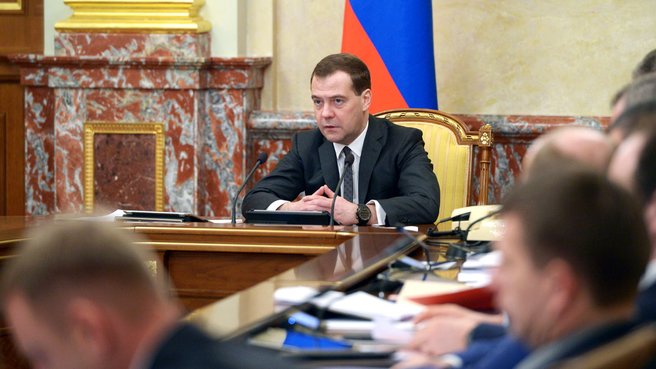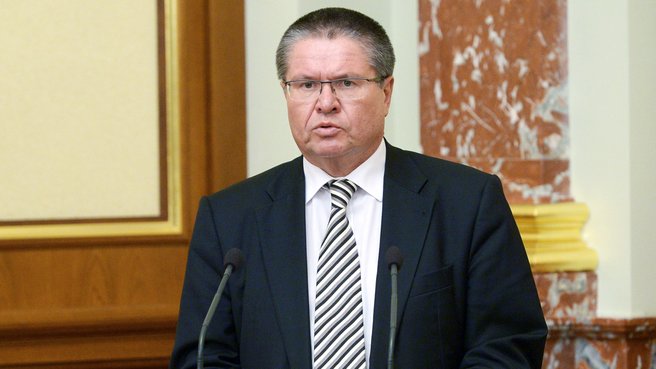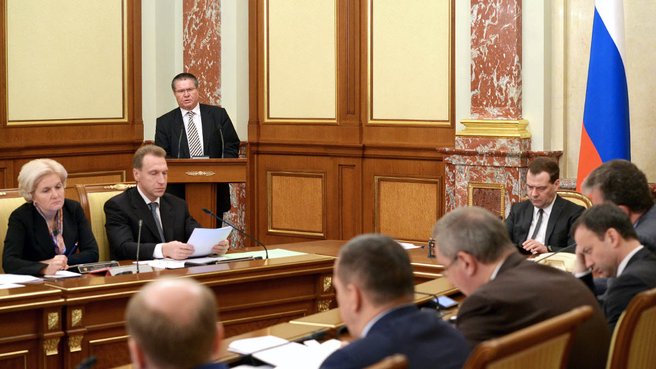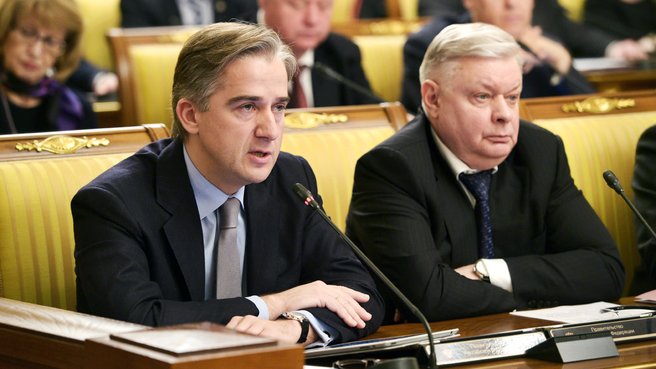Main issue – the procedure for reviewing programmes on the development of strategic companies.
Dmitry Medvedev’s opening remarks
Report by Minister of Economic Development Alexei Ulyukayev
Report by First Deputy Prime Minister Igor Shuvalov
Dmitry Medvedev: Good afternoon. Today we’ll review a number of important issues. All of them deserve out attention, but some need special attention due to their persistent and system-wide nature. One of them concerns education. Let me recall that at the last Government meeting we discussed the modernisation of education. This work is comprehensive and should affect all stages of education. Today we’ll review the Government’s draft directives on federal subsidies for upgrading regional systems of preschool and vocational education in 2014.
Dmitry Medvedev: "One of the Government’s priorities is to guarantee 100% access to preschool education for all children by 2016. We have set the targets. The demand for kindergartens is growing every year. Last year about 400,000 places were created in kindergartens using federal subsidies. We’ll continue resolving this task despite economic difficulties. There is a proposal to transfer 10 billion roubles to 50 regions to continue this work."
One of the Government’s priorities is to guarantee 100% access to preschool education for all children by 2016. We have set the targets. The demand for kindergartens is growing every year. Last year about 400,000 places were created in kindergartens using federal subsidies. We’ll continue resolving this task despite economic difficulties. There is a proposal to transfer 10 billion roubles to 50 regions to continue this work. These funds will go toward the construction, overhaul and repairs of buildings, and on their re-equipment in line with modern standards. Obviously, it is necessary to spend this money efficiently and prudently. I’m addressing regional governors once again – you’re given large sums from the federal budget to reduce the kindergarten waiting list, and we expect you to be efficient and prompt. I don’t have any illusions; we’ll have to add money to the regions for the construction of kindergartens this year (apparently, bringing their expenses to last year's level). Ms Golodets, please draft your proposals in cooperation with the Ministry of Finance, proceeding from economic developments.
As for subsidies for upgrading regional systems of vocational education, they should be provided by the regions. The Government is encouraging the regions, where vocational education is oriented to the needs of the regional economy. A contest between vocational education programmes has been held for more than two years now. This year we plan to transfer over one billion roubles to 45 regions that have won this year’s contest.
One more system-wide task is to improve procedures for granting plots of land for construction, I mean land that is in federal or municipal property. This process must be made easier and these procedures must become uniform and understandable. Regrettably, this is not a new issue. We’ve been discussing it for over five years and it is time to draw the line. The current procedures impede housing construction and economic modernisation. They are creating an additional burden for business and hence are deteriorating the business climate.
Today we’ll review a draft law that is designed to radically change procedures for granting and registering plots of land. Different versions of this draft have been discussed on more than one occasion. The main thing is to make these procedures transparent, ensure equal access to land and remove red tape.
Dmitry Medvedev: "The Government is encouraging the regions, where vocational education is oriented to the needs of the regional economy. A contest between vocational education programmes has been held for more than two years now. This year we plan to transfer over one billion roubles to 45 regions that have won this year’s contest."
The informal practice of resolving land issues should be replaced with clear-cut and transparent procedures that will not involve corruption risks. The period for granting plots of land without tenders should be reduced from three years to three months.
The draft also provides for other norms, such as a general ban on granting land without tenders and a complete list of cases where other procedures apply. Exceptions to this draft can only be made on the basis of acts issued by the President, the Government or governors.
Second, the draft has introduced an obligation to conduct tenders on plots of land based on the applications of individuals and companies but with certain stipulations.
Third, the draft has simplified procedures for granting plots without tenders. This primarily applies to infrastructure facilities; in this case it is clear for what purpose such plots of land are granted and how they will be used.
Fourth, the draft has expanded the list of cases when land is granted for free. People may receive plots for subsidiary holdings, individual housing construction and gardening.
And finally the draft has determined construction deadlines, which are causing heated debates. Plots should be built up in a reasonable time. If they are not developed, their future should be decided in accordance with the law. I hope this will allow us to get rid of cases when buildings remain unfinished for a long time.
Today we’ll also review amendments to the procedures for registering legal entities, in particular, the formation of charter capital in limited liability companies. The draft will acquit future entrepreneurs of the obligation to make preliminary payment of charter capital to a special bank account. I hope this will simplify registration and reduce potential abuse, although these processes should be monitored in any event.
Dmitry Medvedev: "The draft will acquit future entrepreneurs of the obligation to make preliminary payment of charter capital to a special bank account. I hope this will simplify registration and reduce potential abuse, although these processes should be monitored in any event."
One more issue concerns long-term programmes for the development of strategic enterprises and joint stock companies. I’m referring to the enterprises and companies the shares of which are controlled by the state. They provide services that are of national importance: defence capabilities, security and protection of the interests of our citizens. These are not just enterprises of the defence industry or the fuel-and-energy complex but also ship- and aircraft-building, communications companies, banks in which the Government’s has a stake and federal TV and radio broadcasting companies. They are all included in special lists that are approved by the Government. Our Government has already started reviewing the long-term plans of such companies, following their discussion by experts. We’ll continue this work.
And one more issue. I’ve signed a directive on endorsing a concept on the transparency of federal agencies. This issue was subjected to public discussion and some proposals were included into the draft’s final version. I hope this document will be effective.
During the past two years the format of the Open Government has proved its efficiency, although there are no limits to openness. We are often criticised for lack of transparency. At any rate, we’ve made a change – I’m absolutely convinced of this. Preliminary discussion of major Government decisions by independent experts is very important. Ministries should use this experience in various aspects of their activities.
Let’s get down to the first issue on our agenda. First the Minister of Economic Development will speak about reviewing the long-term development programmes of enterprises and joint-stock companies on the list of strategically important companies, after which experts will add their comments. Mr Ulyukayev, please (Alexei Ulyukayev, Minister of Economic Development).
Alexei Ulyukayev: Mr Medvedev, colleagues. Today we will be talking about the fundamental working principles of major companies with state capital, as well as some federal unitary enterprises. Mr Medvedev spoke about their role for our economy in his opening address. There are measures to ensure that they play this role as well as possible, some of which have long been developed and other have been initiated only recently. For example, we are working to reduce the unit costs of our largest companies in real terms by at least 10% within three years.
We are conducting price and technology audits of Russia’s largest infrastructure companies. We plan to report their results by the end of March.
We are cataloguing these companies’ non-core assets with a view to divesting them and are also introducing key efficiency indicators for assessing the performance of their management, which will be taken into account when considering incentives and personnel decisions.
We are drafting innovative development programmes, which are a vital contribution to the implementation of long-term development programmes.
We have been working to create a mechanism of independent directors for companies and to promote best corporate practices at private companies and state unitary enterprises.
Alexei Ulyukayev: "The drafting and implementation of long-term development programmes will become the backbone for all of the afore-mentioned programmes, as well as companies’ internal documents such as strategies, dividend policy, business and financial plans and the like."
We believe that the drafting and implementation of long-term development programmes will become the backbone for all of the afore-mentioned programmes, as well as companies’ internal documents such as strategies, dividend policy, business and financial plans and the like.
Long-term development programmes should therefore include clear goals, tasks, business development guidelines, financial and economic targets, forecasts based on a given company’s investment and dividend policies, as well as the management’s responsibility for effective implementation of these programmes.
We believe that these documents should be designed for at least five years, and possibly longer in some cases.
A long-term development programme is not only necessary for the company in question, but also for all other organisations and persons linked to it by business relations. Existing and potential investors will use this programme to take responsible decisions on investment, counteragents will use it to substantiate their ties with the company, and shareholders will use it to forecast the company’s profitability and possible increases in the value of their shareholding.
The group of companies involved in this work is determined by such regulations as Government Directives No. 91-r and No. 1060 and includes 63 companies and 13 federal state unitary enterprises.
The point at issue now is to consider priority measures for the implementation of this strategy. We propose the following procedure, which we consider methodologically correct.
First, development programmes should be drafted by the company and its management with a planning horizon ranging between 5 and 10 years, considering the company’s strategic goals and its current operation. At the same time, management should be encouraged to take into account the company’s role in the fulfilment of government and federal targeted programmes, the related industries’ development strategies, research and technical development forecasts, and the documents adopted by the President and the Government on the strategic spheres of economic development.
The company’s management then forwards the draft of its programme to a specialised committee of the Board of Directors (for companies) or to the federal executive authorities (for federal state unitary enterprises). Following that, the Ministry of Economic Development and the Federal Agency for State Property Management (Rosimushchestvo) will analyse the draft, including possible risks that may prevent the programme’s implementation, its financial stability and targets, as well as the company’s effectiveness.
Then the federal executive agency in charge will send the draft to the Government, which can discuss the document in several ways depending on a company’s structure.
Alexei Ulyukayev: "The long-term development programmes of the first group of companies, which are the most important companies – the federal state unitary enterprises Federal Grid Company, Russian Grids, Rostelecom, Russian Railways and Russian Post, should be discussed directly at Government meetings."
The long-term development programmes of the first group of companies, which are the most important companies – the federal state unitary enterprises Federal Grid Company, Russian Grids, Rostelecom, Russian Railways and Russian Post, should be discussed directly at Government meetings.
The development programmes of the second group of companies can be discussed at meetings of the relevant Government commission or the Military Industrial Commission, after which the drafts will be forwarded to a Government meeting chaired by the Prime Minister. This group includes the following companies and federal state unitary enterprises: Aeroflot, the Agency for Housing Mortgage Lending, Transneft, Gazprom, United Aircraft Corporation, United Shipbuilding Corporation, Rosneftegaz, Russian Agricultural Bank, Uralvagonzavod, Gosznak, and State ATM Corporation.
The third group of companies whose development programmes will be discussed directly at a meeting of the Government commission or the Military Industrial Commission and will not be then forwarded to the Prime Minister includes Rosagroleasing, RusHydro, Rosgeo, Inter RAO UES, Russian Satellite Communications Company, Rosmorport, Salyut and several other companies.
And lastly, the fourth group of companies whose development programmes will be discussed directly by the federal executive agency that monitors their operation, reported to the Government and discussed at a meeting chaired by the Deputy Prime Minister in charge of their operation includes Sheremetyevo, Alrosa, VTB, Sovcomflot, Zarubezhneft, United Grain Company, Rosspirtprom and Russian Hippodromes. There are more companies in this group, but I will not list them.
After their development programmes are discussed in accordance with the proposed procedure and also by the expert community, the Government will adopt a decision to approve the document or to review it taking into account critical remarks.
The approved long-term development programmes will be implemented by the boards of directors in accordance with the legislation on joint-stock companies. The programmes of federal state unitary enterprises are to be approved by decision of the respective federal executive agency.
Furthermore, we need to regularly audit the implementation of the development programmes of the joint-stock companies that are included in the list of strategic companies. We believe that this will help us to seriously improve the companies’ efficiency, and that regular discussion of the results of such audits by the Government will help to strengthen their effectiveness and compliance with the development goals set to these companies. Thank you.
Dmitry Medvedev: Thank you for outlining the procedure for reviewing the development programmes. Such an approach is possible. However, let’s agree that, should the need arise, I may issue a special resolution to have the development programme of any of the aforementioned companies reviewed either by the Government or at a meeting chaired by myself.
Alexei Ulyukayev: Yes, certainly.
Dmitry Medvedev: Regardless of the company’s size and activity.
Alexei Ulyukayev: Of course. These are just methodological guidelines which…
Dmitry Medvedev: What I mean is that we’ll work under these guidelines. Let’s now hear from the expert community. Mr Sidorov, go ahead please.
Vasily Sidorov (member of the Government Expert Council, managing director at Euroatlantic Investments Limited): Mr Medvedev, members of the Government, colleagues, the Expert Council supports the proposal put forward by the Ministry of Economic Development. The council views the proposal to submit for government approval long-term development programmes by state-owned companies as an integral part of a set of initiatives aimed at improving corporate governance. This issue is even more relevant in a time of slowing economic growth. As for the council, we could go even further by suggesting that the Government should focus on overhauling corporate governance within state-owned companies in 2014.
Against this background, I would like to highlight three things. First, the Government has already recognised the need to enhance the role of the boards of directors in state-owned companies, and the relevant instruction has already been issued by Igor Shuvalov. In this respect, the council expresses its support for this initiative and suggests to implement the current proposal of the Ministry of Economic Development by being more proactive in enabling chairpersons of boards of directors in state-owned companies, heads of specialised committees and independent directors to participate in the approval of development programmes by Government commissions, Deputy Prime Ministers and you, Mr Medvedev.
Vasily Sidorov: "The strategic goals outlined in such programmes should be pegged to annual plans, and annual plans should contain real operational and financial performance indicators for evaluating the performance of executives and developing employee motivation programmes."
Second, members of the Expert Council regard long-term development programmes as a real, genuine guidance for corporate governance and planning, not just a formality. The strategic goals outlined in such programmes should be pegged to annual plans, and annual plans should contain real operational and financial performance indicators for evaluating the performance of executives and developing employee motivation programmes.
And third, long-term development programmes should be harmonised with industry-specific and state development programmes. That said, we are aware of the fact that it is not always possible to update such documents as specific companies approve their long-term development programmes. In this respect, the council proposes not to wait or subordinate one programme to another and to proceed with long-term strategic planning right away, so that long-term programmes, which as Mr Ulyukayev just said, will be drafted by managers, are submitted for approval by the relevant committees of the board of directors by 1 September 2014. This way, these companies will get tangible, workable and genuine development programmes by 2015.
The proposals and report of the Expert Council on this and other points regarding the improvement of corporate governance within state-owned companies have already been submitted to the Government. The council hopes that they will be discussed in more detail during upcoming meetings between the Prime Minister and members of the Expert Council. Thank you for your attention.
Dmitry Medvedev: Thank you. Does anybody want to say anything on the long-term development programmes of state-owned companies? (addressing First Deputy Prime Minister Igor Shuvalov) Mr Shuvalov, go ahead please.
Igor Shuvalov: Mr Medvedev, the materials included in the report by Minister of Economic Development Alexei Ulyukayev were prepared under your instructions and the Government’s action plan to improve corporate governance. With respect to what Vasily Sidorov and Alexei Ulyukayev have just said, it is true that we need to bring corporate governance in state-owned companies, not just their investment programmes, to a new level. I would like to assure all Government members, that in 2014 we are determined to find new approaches to working with both state-owned and private companies that for various reasons are involved with the state and the Russian Government. It is our intention to master new ways of working with boards of directors, since until now the Government has mostly been working with corporate executives and heads, while our engagement with board members was rare. We rarely invite them to our meetings to hear what they have to say. Their opinion does not always coincide with that of the supervisory board chairs.
With this in mind, Mr Medvedev, I would like to ask the Government to support the efforts of the ministry, which worked with independent experts from across the spectrum. I hope that by 2015 the quality of investment programmes will be improved. The most complex cases will be submitted to your attention and reviewed by the Government. Other issues will be addressed by Government commissions or meetings chaired by Deputy Prime Ministers. All Government members are expected to learn how to work with boards of directors. Thank you.
Dmitry Medvedev: Thank you. Are there any other comments or proposals?
I would like to support what Mr Shuvalov has just said: any minister who is engaged with state-owned companies should start working with their boards of directors. As you know, ministers and Government members cannot serve on the boards of directors as used to be the case several years ago, while the number of deputy ministers serving on such boards has been limited. However, this does not mean that you should not meet with the board members. You must meet to discuss the development of these companies, including the performance of directors nominated by the state. What I mean is that at the end of the day they are expected to work in accordance with Government directives. Ministers, as well as other Government members, such as heads of federal agencies who are responsible for a specific industry, should hold such meetings on a regular basis in order to understand what’s happening within the company. It goes without saying that this does not entail any interference in the day-to-day management of such companies, since their executive bodies and the board of directors are there to carry out this work, but you should nevertheless stay abreast of developments within these companies. Make no mistake, this is not about interfering in corporate affairs, just an element of government oversight over decisions taken by state-owned companies. In fact, this is about the owner monitoring its holdings.
Does everyone agree? Let’s make a decision to work under the rules proposed by the Ministry of Economic Development and the Expert Council.
<…>














